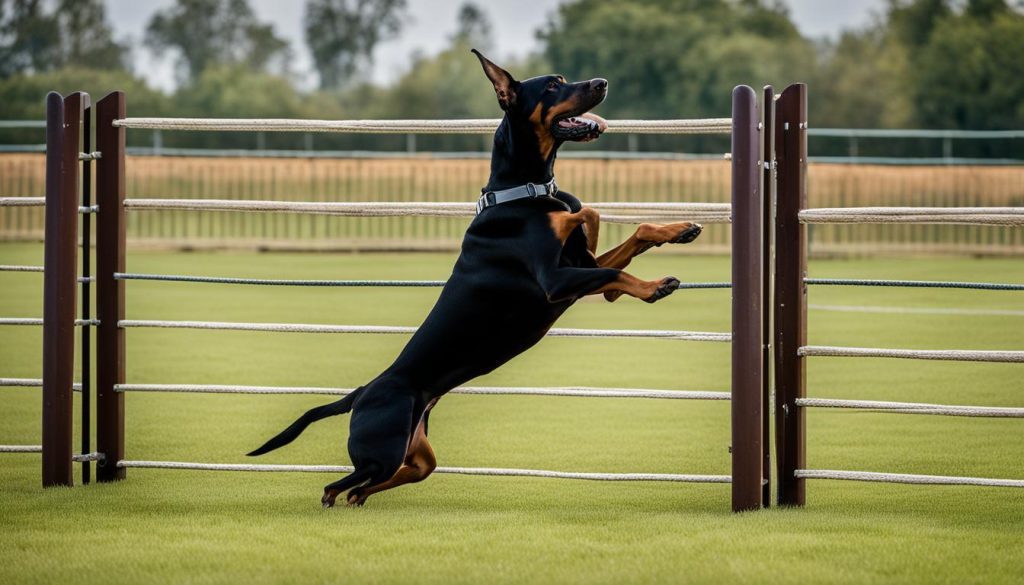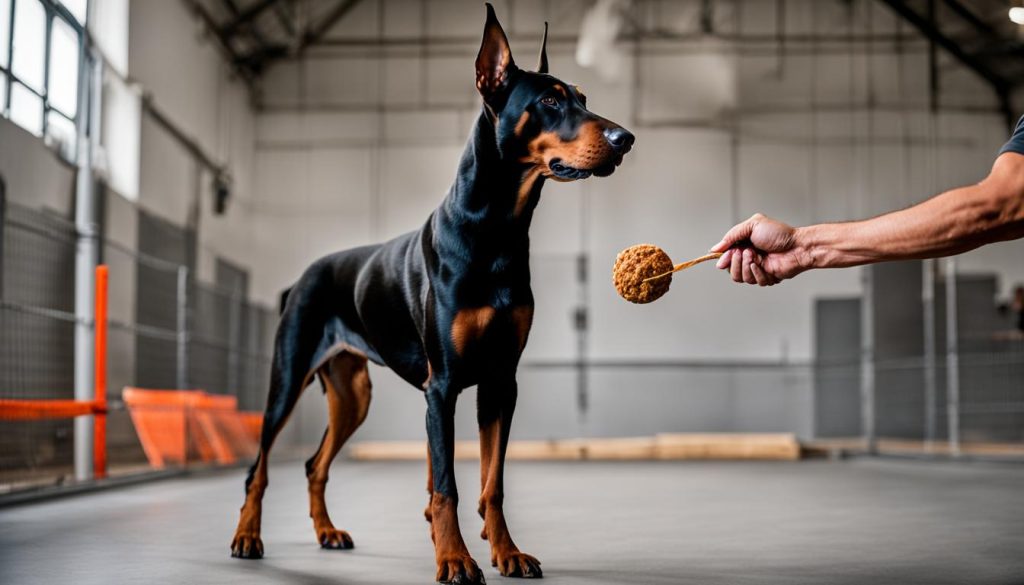Training a Doberman is crucial to unlock their full potential. Known for their loyalty, intelligence, and desire to please, Dobermans thrive in environments where clear leadership and positive reinforcement techniques are employed. Consistency and starting training early are key factors in raising a well-behaved and obedient Doberman.
Doberman Training
- Start training your Doberman as early as possible to establish good behaviors and habits.
- Stick to a schedule to create routine and consistency for your Doberman.
- Use positive reinforcement techniques such as treats and praise to motivate and reward your Doberman during training.
- Understand the unique temperament of Dobermans, their loyalty, and their desire to be close to their owners.
- Obedience training and socialization are essential for a well-behaved and well-adjusted Doberman.
4 Important Doberman Training Tips
When it comes to advanced Doberman training, there are a few key tips and techniques that can help you achieve the best results. From protection training to positive reinforcement methods, these strategies are essential for raising a well-behaved and obedient Doberman.
- Stick to a Schedule: Dobermans thrive on routine and consistency. By implementing regular training sessions at the same time every day, you can help your Doberman feel secure and more receptive to learning. Creating a structured training schedule will establish a sense of stability for your Doberman and enhance their training experience.
- Use Positive Reinforcement: Dobies respond best to positive reinforcement techniques such as treats and praise. By rewarding your Doberman for desired behaviors, you can motivate and reinforce their good behavior. Harsh corrections or physical punishments can lead to fear and aggression, so it is crucial to focus on positive reinforcement methods for a happy and well-adjusted Doberman.
- Start Early: The key to successful Doberman training is to start early. Begin training your Doberman as early as six weeks old at home. This allows them to learn basic commands, socialize, and develop good behavior habits from an early age. Off-site lessons should commence at around four months old, after they have received their vaccinations, to further enhance their training and adaptability.
- Understand Their Temperament: Dobermans are known for their loyalty and devotion to their owners. Often referred to as “Velcro dogs,” they are highly attached and want to be close to their families. Clear and consistent direction is essential for their training and overall well-being. By understanding their temperament and using positive reinforcement techniques, you can build a strong bond and foster a successful training relationship with your Doberman.
Implementing these advanced Doberman training tips, such as sticking to a schedule, using positive reinforcement, starting training early, and understanding their temperament, can help you shape a well-behaved and obedient Doberman. Remember, positive and consistent training methods are essential for the best results.

Obedience Training a Doberman Pinscher
When it comes to raising a well-behaved Doberman, obedience training is essential. Teaching your Doberman basic commands is the foundation for good behavior and a strong bond between you and your furry friend. By using positive reinforcement and consistent training techniques, you can shape your Doberman into a well-mannered and obedient companion.
Basic commands such as sit, stay, lie down, off, come, drop it, leave-it, and release command are essential for everyday interactions with your Doberman. These commands can be taught using positive reinforcement, which involves rewarding your Doberman with treats, praise, or play for executing the command correctly.
Consistency is key when it comes to obedience training. Always use the same cues and gestures for each command, and ensure that all family members use the same training techniques. This helps your Doberman understand what is expected of them and reduces confusion.
While training your Doberman at home is a great start, participating in group training classes with professional trainers can provide additional benefits. These classes offer structured obedience training sessions in a controlled environment, allowing your Doberman to learn alongside other dogs and practice their socialization skills. Trainers can also provide specialized guidance and techniques for more advanced obedience training.
Remember, obedience training is not a one-time activity. It requires ongoing practice and reinforcement to maintain your Doberman’s skills. Incorporating short training sessions into your daily routine can help reinforce the commands and keep your Doberman engaged and responsive.
Benefits of Obedience Training a Doberman Pinscher:
- Enhances communication and understanding between you and your Doberman
- Promotes good behavior and prevents common behavioral issues
- Strengthens the bond and trust between you and your Doberman
- Ensures safety and control in public settings
- Provides mental stimulation and a sense of purpose for your Doberman
Obedience training is an investment in your Doberman’s well-being and your relationship. Through positive reinforcement and consistent training techniques, you can shape your Doberman into a well-behaved and obedient companion. Whether you choose to train your Doberman at home or attend professional training classes, the keys to success lie in patience, commitment, and a mutual understanding.

House Training Your Doberman Puppy
House training your Doberman puppy is an important step in raising a well-behaved and clean companion. With consistency and the right techniques, you can successfully potty train your puppy in just a few weeks.
One effective method is to combine house training with crate training. The crate should be a comfortable and safe space for your puppy to rest and sleep. Take your puppy outside to their designated potty spot after waking up, eating, drinking, and playing. Be proactive in anticipating when your puppy needs to go.
When outside, use a consistent command, such as “go potty,” to signal what you want your puppy to do. Wait patiently for them to eliminate, and once they finish, reward and praise them immediately. This positive reinforcement helps reinforce the desired behavior.
It’s important to be prepared for frequent bathroom breaks. Puppies have small bladders and may need to relieve themselves every 1-2 hours. As they grow, they will be able to hold their bladder for longer periods. On average, puppies may require 8-10 bathroom breaks a day.
Tips for House Training Your Doberman Puppy:
- Establish a routine: Stick to a consistent schedule for feeding, playtime, and bathroom breaks. This helps your puppy develop a predictable pattern for elimination.
- Supervise closely: Keep a watchful eye on your puppy, especially during the early stages of house training. This allows you to quickly identify signs that they need to go outside.
- Be patient and positive: House training takes time and accidents may happen. Maintain a calm and positive attitude to encourage your puppy’s progress.
- Clean accidents properly: If accidents occur indoors, clean them thoroughly with an enzymatic cleaner to remove any lingering scent that may attract your puppy back to the same spot.
By following these effective house training techniques and being consistent in your efforts, you can successfully potty train your Doberman puppy and set them on the path to good house manners.
Socializing Your Doberman
As a Doberman owner, I understand the significance of socializing my furry friend. Socialization plays a critical role in helping Doberman puppies develop into well-adjusted and confident adults. By exposing them to new people, places, and experiences, I can build their trust and reduce anxiety. It’s an essential aspect of their behavioral training and overall development.
Positive reinforcement is the key to successful socialization. When my Doberman puppy interacts with new individuals, I make sure to reward their good behavior and provide plenty of praise. This approach helps them associate positive experiences with meeting new people, making the process more enjoyable for both of us.
I take my Doberman to various places, such as parks, pet-friendly stores, and outdoor cafes, where they can experience different environments and encounter unfamiliar sights, sounds, and smells. This exposure helps them become more comfortable in different situations, making them less likely to feel anxious or fearful in new surroundings.
I practice consistency in socialization efforts by introducing my Doberman to diverse situations regularly. Whether it’s encountering new people, encountering other dogs, or exploring new environments, repeated exposure helps build their confidence and adaptability.
The Benefits of Doberman Training Classes
While socializing my Doberman at home is essential, I also find value in enrolling them in doberman training classes. These classes provide structured training sessions and opportunities for my dog to socialize with other dogs in a controlled environment. With the guidance of professional trainers, my Doberman can learn valuable skills and interact with other puppies, enhancing their socialization experience.
Additionally, doberman training classes offer a chance for both me and my dog to learn new training techniques and best practices. The expertise of professional trainers ensures that I can address any specific behavioral issues my Doberman may have and receive targeted guidance for their training needs.
In conclusion, socializing my Doberman is an integral part of their puppy training journey. By providing positive exposure to new people, places, and experiences, I can help them become well-adjusted and confident adults. Consistent practice, both at home and in professional doberman training classes, ensures that they will be comfortable and well-behaved in various situations throughout their lives.
Conclusion
Training a Doberman requires patience, consistency, and positive reinforcement. By starting early and understanding their unique temperament, you can shape your Doberman into a well-behaved and obedient companion. While professional trainers offer valuable guidance, training your Doberman at home can be equally effective with the right techniques and resources.
Professional Doberman trainers have extensive experience in handling and training these magnificent dogs. Their expertise can be invaluable in teaching advanced commands and addressing specific behavioral issues. If you feel overwhelmed or want to take your Doberman’s training to the next level, consulting a professional trainer is highly recommended.
At the same time, there are plenty of resources available for training your Doberman at home. Online tutorials, books, and video courses provide step-by-step instructions tailored to Doberman training. By following proven techniques and incorporating positive reinforcement methods, you can establish a strong bond and effectively communicate with your Doberman.
With proper training, your Doberman will develop the skills and behaviors necessary to be a well-rounded and obedient pet. Remember to be patient, consistent, and understanding throughout the training process. The effort you invest in training will result in a lifelong partnership filled with love, companionship, and mutual respect.
FAQ
What are some important tips for training a Doberman?
Stick to a schedule, use positive reinforcement, start training early, and understand their temperament.
What commands should I teach my Doberman during obedience training?
Basic commands such as sit, stay, lie down, off, come, drop it, leave-it, and release command are important.
How can I potty train my Doberman puppy?
Combine crate training with regular bathroom breaks and reward them for going outside.
Why is socialization important for Doberman puppies?
Socialization helps them develop into well-adjusted and confident adults by exposing them to new experiences.
Can I train my Doberman at home or should I seek professional training?
You can train your Doberman at home with the right techniques, but professional trainers can provide guidance and advanced training.






